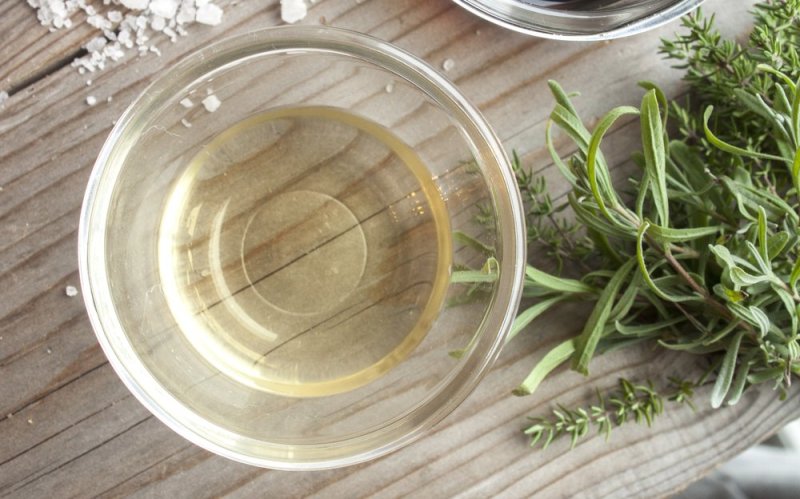White wine vinegar is a type of vinegar made from fermented white wine. It can be used to pickle foods, deglaze pans, marinate several types of meat, and create decadent sauces. It is also found in some desserts. The tangy flavor of white wine vinegar is common in French cuisine in vinaigrettes, soups, stews, and delicious Hollandaise and Béarnaise sauces.
When a recipe calls for white wine vinegar and you have none on hand, don’t worry — there are many other types of vinegar that you could substitute. However, although all vinegar is acetic acid, each type of vinegar has its own unique flavor. Some vinegar is more acidic and stronger in taste.
8 Substitutes For White Wine Vinegar
Red Wine Vinegar

Substitute one tablespoon of red wine vinegar for one tablespoon of white wine vinegar.
Like white wine vinegar, red wine vinegar is made from wine. This makes red wine vinegar an excellent substitute for white wine vinegar, since both types of vinegar have the same acidity level. However, be aware that red wine vinegar will alter the shade of your food if your dish is lighter in color. Also, red wine vinegar tends to be slightly more robust in flavor.
Rice Vinegar

Substitute one tablespoon of rice vinegar for one tablespoon of white wine vinegar.
Rice vinegar, which is made from fermented rice, is widely used in Asian cuisine in stir-frys, soups, and rice dishes. It’s less acidic than white wine vinegar and has a milder flavor and a subtle sweet taste. However, it is a suitable replacement for white wine vinegar in some dishes.
Sherry Vinegar

Substitute one tablespoon of sherry vinegar for one tablespoon of white wine vinegar.
Sherry vinegar has a more subdued flavor profile than white white vinegar or red wine vinegar. It provides a balanced acidic character that works well in many dishes. Sherry vinegar starts relatively light and becomes darker as it ages. The darker your sherry vinegar is, the more robust the flavor will be. It is best to substitute lighter, younger sherry vinegar for white wine vinegar.
Champagne Vinegar

Substitute 1 1/2 tablespoons of champagne vinegar for one tablespoon of white wine vinegar.
Champagne vinegar is made from the juice of wine grapes, and more specifically, champagne grapes. It is much lighter and more delicate in flavor than white wine vinegar, but it serves as an excellent substitute in dressings, sauces, and marinades.
Apple Cider Vinegar

Substitute one tablespoon of apple cider vinegar for one tablespoon of white wine vinegar.
Apple cider vinegar is a decent substitute for white wine vinegar. While it has a similar acidity to white wine vinegar, apple cider vinegar has a distinct apple aroma and a subdued apple flavor. The flavor and color difference between apple cider vinegar and white wine vinegar is more apparent when larger amounts of vinegar are used.
White Vinegar

Substitute three-fourths of a tablespoon of white vinegar, one-fourth of a tablespoon of water, and a dash of sugar for one tablespoon of white wine vinegar.
White vinegar is more acidic than white wine vinegar. It’s best to dial this substitute down a bit by diluting it first. White vinegar is also the least flavorful of the substitutions on our list, so it won’t work for you if you want the flavor of white wine vinegar in addition to its acidity.
Balsamic Vinegar

Substitute one tablespoon of balsamic vinegar for one tablespoon of white wine vinegar.
Balsamic vinegar is made from concentrated wine grape juice from the Modena region of Italy. It has a rich and intense flavor that is generally used sparingly. Balsamic vinegar’s unique flavor means that it isn’t an ideal substitute for white wine vinegar. It’s also hard to find a substitute for balsamic vinegar when you don’t have any around.
Lemon Juice

Substitute one tablespoon of lemon juice for one tablespoon of white wine vinegar.
If you’re in a pinch, lemon juice offers an acidic flavor that is similar to the tangy taste of white wine vinegar. However, white wine vinegar contains acetic acid, which is sharper than the citric acid present in lemon juice.
If you find yourself in need of a replacement for white wine vinegar, you’re in luck. There are several great substitutions for white wine vinegar that will provide the right flavor and acidity for your recipe. If possible, try to use one of the first five substitutions listed above, but you can use white vinegar, balsamic vinegar, or lemon juice if you’re in dire need.
